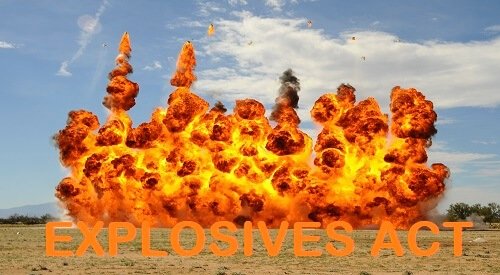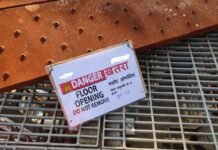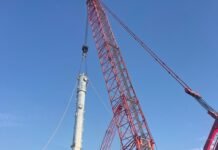
Explosives Act 1884:
This Act (4 of 1984) was enacted on 26-2-1884, it came in to force from 1-7-1884. It extends to the whole of India. It has 18 sections.
Its object is to regulate the manufacture, possession, use, sale, transport, import and export of explosives.
Explosive as defined in Sec. 4 (d) means gunpowder, nitro-glycerine, nitro-glycol, guncotton, di-nitro-toluene, tri-nitro-toluene, picric acid, di-nitro-phenol, tri-nitro resorcinol (styphnic acid) cyclo tri-methylene-tri-nitroamine, petra-erythritol tetranitrate, tetryl, nitroguanidine, lead azide, lead styphnate, fulminate of Mercury or every other metal, diazo-di-nitro phenol, colored fires or every other substance, whether a single chemical compound or a mixture of substances, whether solid or liquid or gaseous used or synthetic which will produce a practical impact by explosion or pyrotechnic effect and includes fog-signals, fireworks, fuses, rockets, percussion-caps, detonators, cartridges, ammunition of all descriptions and every adaptation or preparation of as an explosive as defined in this clause.
Aircraft carriage and vessel are also defined in this section: Explosives Act 1884
Main Provisions: Explosives Act 1884
- A person below the age of 18 years, offender of violence or moral turpitude, who is ordered to keep the peace or good behaviour or whose licence is cancelled for any Offence underneath this act, can’t manufacture, promote, transport, import or export, supply or dispatch or possess any explosive defined or notified. (Sec. 6A)
- The license may be granted, refused, numerous, suspended, revoked and situations may be imposed (Sec. 6B to 6E). The appeal can be preferred as per sec. 6F.
- The Central Government has the power to make rules regarding inspection, search, seizure, detention and removal (Sec. 7).
- Notice of accident is required u/s 8 and its inquiry shall be conducted u/r 9. The Central Government can inquire into more serious accidents (Sec. 9A).
- Explosives with receptacles shall be forfeited by the court after conviction (Sec. 10).
- Abetment and attempt to commit offense under this Act or Rules is punishable (Sec. 12).
- Any person found committing any offense punishable under this Act can be arrested without a warrant be removed from the place and conveyed before a magistrate (Sec. 13).
- The Central Government can delegate its power to the State Government or an officer u/s 17 A.




